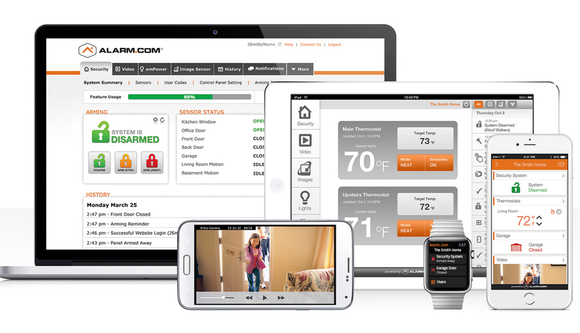3 High-Growth Tech Stocks I Think Investors Can Buy on a Sell-Off
Long-term investing outperforms short-term trading. And when it comes to truly disruptive companies, approaching them with a long-haul mind-set can pay off handsomely, especially if you use market weakness as an opportunity to buy shares. While there's no telling where these companies will go in the short term, I believe the tailwinds for HubSpot Inc. (NYSE: HUBS), Skyworks Solutions Inc. (NASDAQ: SWKS), and Alarm.com (NASDAQ: ALRM) are strong enough to support picking them up when the market heads lower.
Sit back and let the sales roll in
Increasingly, companies are turning to inbound marketing as an effective and low-cost way to connect with would-be customers and grow revenue. That's good news for HubSpot and its investors.

IMAGE SOURCE: GETTY IMAGES.
HubSpot is a leader in providing solutions enabling inbound marketing. The company's 37,450 customers (up from 25,541 one year ago) use its offering to attract more people to their websites by leveraging relevant content across social media and SEO.
Most of its customers are small to mid-size businesses and the majority of the company's revenue -- 95% -- comes from subscriptions to its cloud-based software platform. Importantly, its subscription revenue scales alongside each client's growth. For example, it gets more money when the number of contacts in a customer's database hits specific levels and it upsells add-on features.
Although its contracts with customers are typically less than one year in length, they're noncancellable and billed in advance. Not that it matters. Customers seldom seem to want to cancel. HubSpot's subscription dollar retention rate -- a measure of retention that compares contractional revenue at the beginning of a month to contractional revenue at the end of a month -- was 98.5% in 2016.
HubSpot may not be profitable yet, but its fast growth leads me to believe that it could simply be a matter of time before that happens. Revenue was $97.7 million in Q3, up 38% year over year, and its fourth-quarter guidance is for revenue growth of 33% year over year at the midpoint.
Admittedly, HubSpot's reliance on companies with smaller marketing budgets could mean that its business does better in an expanding economy than it does in a recession. However, there's little sign of a recession on the horizon and even if the economy does stall, inbound marketing is arguably a better value than other forms of marketing. For this reason, I'll be looking to pickup HubSpot shares on a drop.
Connections matter
Skyworks Solutions is a leading manufacturer of products that wirelessly connect devices to the internet and each other. As a result, it's a big beneficiary from mobile device and Internet of Things (IoT) consumer products growth.
Historically, it's been very reliant on Apple for growth because contract manufacturer Foxconn accounts for about 40% of its quarterly sales. That relationship isn't necessarily a bad thing given the potential iPhone upgrade supercycle. However, the company's making solid progress in growing its customer base, and IoT is a big reason for its success.
Despite heavy exposure to Apple, it's far from the company's only big consumer electronics customer. Samsung accounts for about 12% of sales and Huawei is about 10% of sales. It also does business with automakers, defense contractors, and, of course, IoT companies, including Sonos.
Demand from mobile device makers accounts for most of Skyworks sales, but increasingly more revenue is coming from IoT solutions, and IoT represents about 25% of revenue.
Growing demand across its customers resulted in record fiscal fourth-quarter revenue of $984.6 million, up 18% year over year. Skyworks' non-GAAP earnings of $1.82 per share last quarter were up 24% from the same quarter last year.
Overall, if you expect mobile data to continue to grow (I sure do) and more devices in the home to connect to each other and the internet (yup), then picking up Skyworks shares on a pullback is the right move to make, especially when you consider that global mobile data usage is expected to grow fivefold by 2021 and estimates are for 75 billion IoT devices by 2025.

IMAGE SOURCE: ALARM.COM.
Managing your world
Speaking of the IoT, if you're wondering how you're going to be able to control all of these devices simply, look no further than Alarm.com.
Alarm.com is a technology company disguised as a security company. Yes, it provides a service that protects homes and businesses from break-ins and fires, but it also helps consumers and business owners control IoT devices on their property. Using Alarm.com's software, customers can manage smart thermostats, lock and unlock smart door locks, adjust lighting, open garage doors, and control video cameras from a smartphone, tablet, virtual assistant, or PC.
Alarm.com sells its technology through independent security companies and it's already locked up 5 million customers. Importantly, there's still plenty of room left to grow. The number of smart homes is expected to double to 16 million by 2021, and it's also only scratching the surface of small businesses and international sales. Small businesses make up less than 6% of sales, yet there are 4 million small properties in the U.S. alone that could be a good fit for Alarm.com's offering. Overseas, the company expects growing global wealth to help international revenue become a much larger contributor to its bottom line.
Recently, Alarm.com shares fell sharply following its third-quarter financials. Personally, I think that drop could be a smart buying opportunity. The company's total revenue increased 33% to $90 million and its net income increased to 16.8% of revenue in the third quarter, up from 3.8% last year. Weakness may stem from comments from management regarding the possible impact of changes to accounting standards that could impact how it records commissions, but any headwinds stemming from that accounting issue should be short term, and frankly, I think they're likely to pale in comparison to the long-haul tailwinds associated with securing and managing increasingly internet-connected homes and businesses.
Play the long game
If your investment horizon is measured in days, weeks, and months, then recognize that the stock market can relentlessly punish even the most disruptive growth company over those spans. Over a longer window of time, however, it becomes more likely that the disruption caused by these companies will be rewarded with revenue and profit growth. In that scenario, using inevitable market corrections to pick up shares in stocks like HubSpot, Skyworks Solutions, and Alarm.com could be very rewarding.
More From The Motley Fool
6 Years Later, 6 Charts That Show How Far Apple, Inc. Has Come Since Steve Jobs' Passing
Why You're Smart to Buy Shopify Inc. (US) -- Despite Citron's Report
Todd Campbell owns shares of Apple. His clients may have positions in the companies mentioned. The Motley Fool owns shares of and recommends Apple, HubSpot, and Skyworks Solutions. The Motley Fool has the following options: long January 2020 $150 calls on Apple, short January 2020 $155 calls on Apple, short November 2017 $92 puts on Skyworks Solutions, and short January 2018 $105 calls on Skyworks Solutions. The Motley Fool recommends Alarm.com Holdings. The Motley Fool has a disclosure policy.

 Yahoo Finance
Yahoo Finance 